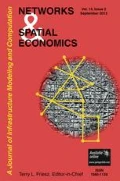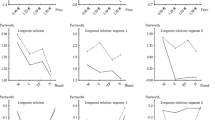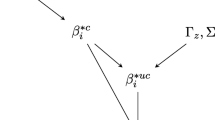Abstract
The flexible structure of the mixed logit (ML) model is at the root of the difficulties associated to its estimation. Major problems are parameter identification and the distinction between different substitution patterns. In this paper we focus on the empirical identification problem and investigate the effect of low information richness in the data on the capability of estimating a correct ML model (i.e. with identifiable parameters and free of confounding effects). In particular, we analyse to which extent the empirical identification problem depends on the variability of the data among alternatives, on the degree of heterogeneity of the taste parameters, on the dimension of the sample and on the number of choice tasks for each individual. To test for information richness of the data and its effect on the capability of the ML model to reproduce random heterogeneity in tastes, a collection of datasets was generated varying systematically (a) the standard deviation (SD) of the distribution of travel time differences between the two alternatives, (b) the SD of the random parameter, (c) the number of choice tasks for each individual and (d) the number of individuals in relation to the number of choice tasks. Then, several ML models allowing for random travel time parameters were estimated using different number of draws and results were compared in terms of model goodness of fit and, also, on the capability of reproducing the real parameters used to generate each dataset. Our results suggest that identification problems depend only on the (low) variability of the associated data and disappear as the richness of the data associated to the random parameter increases. However, rich enough data only allows obtaining good statistics but the estimated parameters do not always reproduce the correct values, as the capability of the ML to reproduce random heterogeneity depends on the random parameter distribution (degree of variability and symmetry). Moreover, the capability of the ML to reproduce random heterogeneity increases when more than one choice is available for each individual and the effect of sample size on the empirical identification reduces considerably.
Similar content being viewed by others
References
Bath C, Castelar S (2002) A unified mixed logit framework for modelling revealed and stated preferences: formulation and application to congestion pricing analysis in the San Francisco Bay Area. Transp Res 36B:593–616
Brownstone D, Bunch D, Train K (2000) Joint mixed logit models of stated and revealed preferences for alternative-fuel vehicles. Transp Res 34B:315–338
Cherchi E, Ortúzar JdeD (2006) Predicting best with Mixed Logit models: understanding some confounding effects. Environ Plan A (under review).
Cherchi E, Ortúzar JdeD (2007a) A Monte Carlo analysis to explore the effect of data richness in the empirical identification of the mixed logit model. 11th World Conference on Transport Research, Berkeley, California, 24–28 June 2007
Cherchi E, Ortúzar JdeD (2007b) On the efficiency of Mixed Logit parameters estimates: analysing the effect of data richness XIII Congreso Chileno de Ingeniería de Transporte, Santiago, 22–26 October 2007
Cherchi E, Polak JW (2005) The assessment of user benefits using discrete choice models: implications of specification errors under random taste heterogeneity. Transp Res Rec 1926:61–69
Chiou L, Walker J (2006) Identification and estimation of mixed logit models under simulation methods. 25th Annual Meeting of the Transportation Research Board. Washington, DC, January 2006
Hensher DA (1998) Extending valuation to controlled value functions and non-uniform scaling with generalised unobserved variances. In: Gärling T, Laitila T, Westin K (eds) Theoretical foundations of travel choice modelling. Elsevier, Amsterdam
Hensher DA, Greene WH (2003) The mixed logit model: the state of practice. Transportation 30:133–176
Koopmans TC (1949) Identification problems in economic model construction. Econometrica 17:125–144
Munizaga M, Alvarez R (2001) Mixed logit vs. nested logit and probit models. 5th Tri-annual invitational choice symposium. Workshop: hybrid choice models, formulation and practical issues. Asilomar, Texas
Munizaga M, Alvarez R (2005) Testing mixed logit and probit by simulation. Transp Res Rec 1921
Sillano M, Ortúzar JdeD (2005) Willingness-to-pay estimation with mixed logit models: some new evidence. Environ Plan 37A:525–550
Swait JD, Bergantino A (2000) Distinguishing taste variation from error structure in discrete choice data. Transp Res 34B:1–15
Train KE (2003) Discrete choice methods with simulation. Cambridge University Press, Cambridge
Walker J (2001) Extended discrete choice models: integrated framework, flexible error structures, and latent variables. PhD Thesis, Department of Civil and Environmental Engineering, MIT
Walker J (2002) The mixed logit (or logit kernel) model: dispelling misconceptions of identification. Transp Res Rec 1805:86–98
Williams HCWL, Ortúzar JdeD (1982) Behavioural theories of dispersion and the mis-specification of travel demand models. Transp Res 16B:167–219
Author information
Authors and Affiliations
Corresponding author
Rights and permissions
About this article
Cite this article
Cherchi, E., de Dios Ortúzar, J. Empirical Identification in the Mixed Logit Model: Analysing the Effect of Data Richness. Netw Spat Econ 8, 109–124 (2008). https://doi.org/10.1007/s11067-007-9045-4
Published:
Issue Date:
DOI: https://doi.org/10.1007/s11067-007-9045-4




